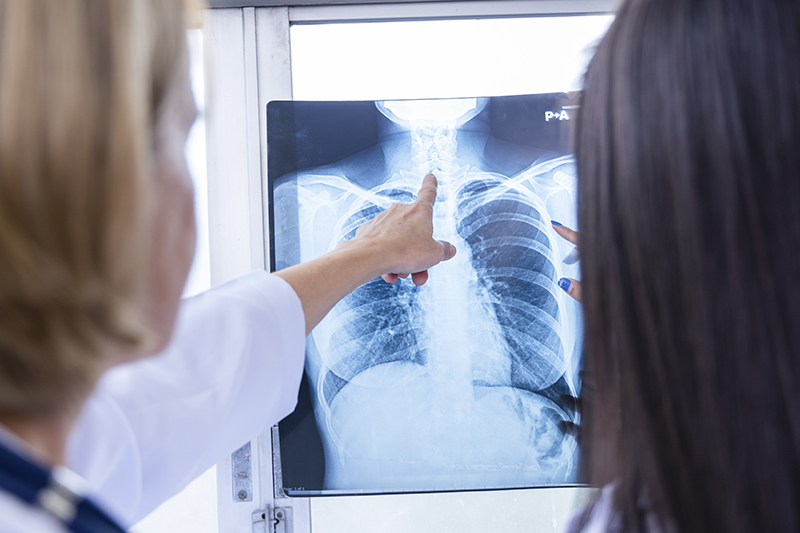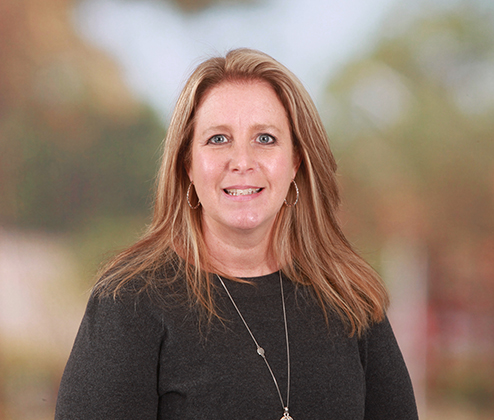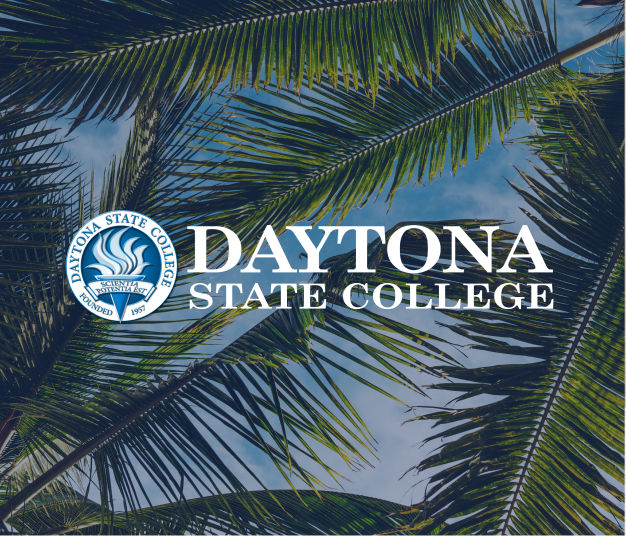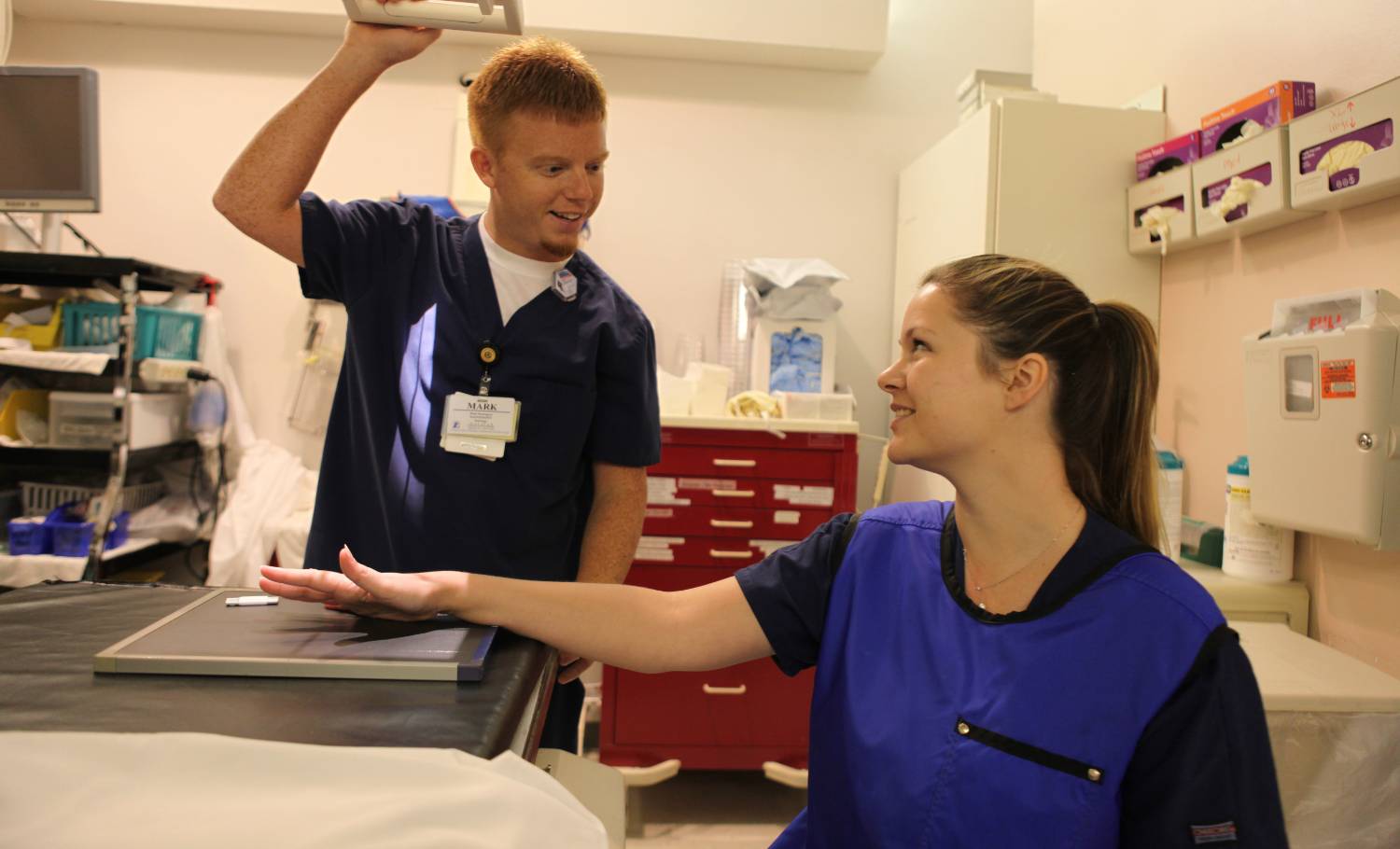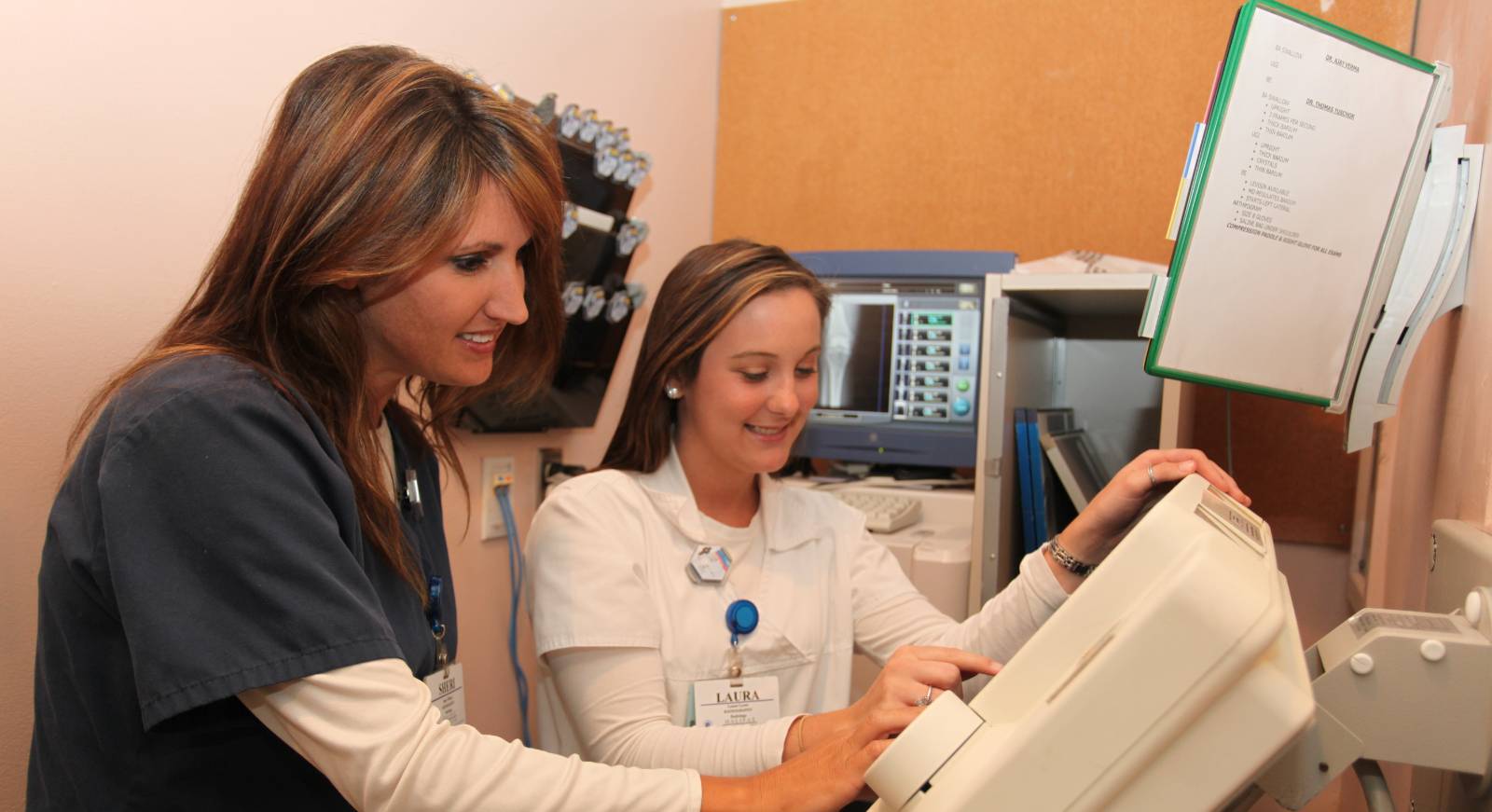
Radiography, A.S. (Limited Access Program)
Your Path to Success
As a Registered Technologist in Radiography, you will play a vital role in healthcare
by utilizing x-ray technology to assist in the diagnosis and treatment of patients.
Radiographers are skilled professionals who perform imaging procedures that help radiologists
interpret critical information to guide patient care.
In this program, you'll develop not only the technical expertise to produce high-quality
diagnostic images but also the professional judgment and critical thinking skills
essential to delivering exceptional care. Radiographers are compassionate, multi-skilled
caregivers who stay at the forefront of medical advancements by engaging in continuous
learning and adapting to new technologies.
-
Assessment Goals & Student Learning Outcomes To support the achievement of overall program mission and goals.
Goal 1: Students will be clinically competent to perform diagnostic exams under the proper supervision.
Student Learning Outcomes:
- Students will apply positioning skills.
- Students will possess knowledge of routine procedures.
- Student will evaluate and adjust technical factors based on exposure indicator values.
- Students will practice radiation protection.
Goal 2: Students will communicate effectively and demonstrate oral and written communication skills.
Student Learning Outcomes:
- Students will use effective oral communication skills.
- Students will practice written communication skills
Goal 3: Students will use critical thinking and problem-solving skills.
Student Learning Outcomes:
- Students will adapt procedures for non-routine examinations.
- Students will critique images to determine optimal image quality for individual patients.
Goal 4: Students will model professionalism.
Students will demonstrate professional ethics to include initiative, dependability, and appearance.- Students will be exposed to professional organizations to promote lifelong learning and professional development.
Goal 5: The program will graduate entry-level technologists. (Program Effectiveness)
- Five-year average credentialing examination pass rate of not less than 80% at first attempt within six months of graduation.
- Average section summary score > 8.0 for each area on ARRT exam.
- Five-year average job placement rate of not less than 75% within twelve months of graduation of those actively seeking employment.
- Students will complete the program within 24 months.
Graduates will be satisfied with their education. - Employers will be satisfied with the graduate’s performance.
-
Admission Requirements The application deadlines are January 31 for the Summer start and September 30 for the Spring start; however, it is encouraged to submit the completed form as soon as possible (applications are accepted year-round).
Each phase must be completed before moving to the next phase in the selection process.
Phase 1
- Complete School of Health Careers Application
- Complete TEAS test (Test of Essential Academic Skills. There is a fee for this exam. Learn more on our Testing Center webpage.) at Daytona State College
- Submit transcript documenting completion of prerequisite courses with a “C” or better
and overall college GPA of 2.5 or higher.
- ENC 1101
- MAC 1105
- BSC 1085C
- Review Additional Admission Requirements
- Review Interview Rubric
Phase 2
Interview with the Selection Committee
You will be notified by email to your FalconMail account of the status of your selection by mid-March for the Summer start and mid-October for the Spring start.Phase 3
- Complete Student Health form. Issued during Orientation to the Radiography program. Each student is responsible for obtaining a physical, immunizations, and health records. Students are responsible for providing a copy of updated immunizations (TB).
- Submit Level II Background Check and drug testing with negative result.
-
- Complete the request form received
- Report to designated center for electronic fingerprinting and pay fee
- Complete acknowledgment and consent for release of information
- DSC receives access to the Level II Background Check
- Report reviewed by a college representative
- Report reviewed by committee of School of Health Careers (if positive report)
- A DSC representative will contact student with admission decision
Students selected for admission are accepted on a provisional basis pending verification of a negative drug test and successful completion of a level II background check.
A second screening will be required prior in the third semester of the program. A change in the law as of August 2010 (F.S. Chapter 408) significantly modifies the background screening for health care service providers. Students will not be allowed to participate in clinical if they do not comply with this requirement. A clinical component must be successfully completed with all health care programs. The cost for the level two screening and drug testing is around $90.
-
Safety & Ability Physical Capabilities
Students must be able to make and report visual observations, differentiate between shades of black, white and gray, work in subdued lighting, and carry out verbal and written orders. Eyesight must be 20/40 or be corrected to that level.Students must be able to hear blood pressures, breath sounds, verbal orders, and during emergencies, hear alarms or distress calls from patients. Hearing must be corrected to no more than a 50 percent loss.
Students must be able to palpitate patients for positioning, taking pulses and determining body temperature.
Students must be able to stand for an eight-hour period, and/or move quickly at times. It is often necessary to lift, move, or support patients and/or equipment of greater size and weight than self. Therefore, strength of back, legs, and arms, and the ability to use proper body mechanics are necessary for the safety of both patients and students.
Mental Emotional Capacity
Students must be able to think clearly, critically, and logically to make valid and ethical judgments effectively in stressful situations. Students need the ability to perceive events realistically, think rationally and function independently in routine or emergency situations. When necessary, in the judgment of clinical or didactic faculty a certified psychologist or psychiatrist will determine this ability.Communication Ability
Students must be able to communicate observations to others in a clear, concise manner in both oral and written forms. In the judgment of the clinical instructors, the student must be able to speak and interact effectively with patients and members of the health care team.Pregnant Students
To allow for radiation protection of the pregnant student and their conceptus, the program officials will counsel pregnant students as to options available and reasonable accommodations required to remain in the clinical setting. Students have the option of declaration of non-declaration of pregnancy.Radiation Safety
Student radiographers are issued a radiation monitor to estimate their dose equivalent per month. Specific course work is completed in radiation protection measures throughout the Program.
Launch your path with a Radiography degree
Our Mission
To provide multi-skilled, comprehensive education for students in Radiologic sciences. The Program will promote standards to meet stated outcomes for service-oriented professionals that are entry-level into the profession, and promote multi-competency, and lifelong goals.Program Goals
To provide the health care community with graduates who possess:- Ability to assume their role as an entry-level radiographer in providing quality patient care
- Critical thinking and problem-solving skills to practice as competent radiographers
- Professional values and attributes to maintain a high standard of ethical conduct with patients, peers, employers, and other members of the health care team
- Motivation to continue their professional growth and development
Key Dates
Deadline to Apply
- Spring Start: September 30 (for class beginning in Spring semester)
- Summer Start: January 31 (for class beginning in Summer semester)
- Applications are accepted all year, but only those submitted by the deadline will be considered for the next cohort.
Offered in February to students who have submitted an application by deadline. Dates of the offered informational session will be emailed to all applicants. Informational sessions must be scheduled with the program office.
Applicant Interviews
- Spring Start Cohort: Late October
- Summer Start Cohort: Early March
Sample Student Schedules
First Year – Spring Start Cohort
Spring Semester
- Clinical: Tue/Thu, 8 a.m.–3 p.m.
- Class: Mon/Wed/Fri
- Lab: Wed
Summer Semester
- Clinical: Mon/Wed (12 students 8–3; 12 students 3–10)
- Class: Tue/Thu
- Lab: Fri
Fall Semester
- Clinical: Mon/Wed (12 students 8–3; 12 students 3–10)
- Class: Tue
- Lab: Fri
First Year – Summer Start Cohort
Summer Semester
- Clinical: Tue/Thu, 8 a.m.–3 p.m.
- Class: Mon/Wed/Fri
- Lab: Wed
Fall Semester
- Clinical: Tue/Thu (12 students 8–3; 12 students 3–10)
- Class: Mon/Wed
- Lab: Fri
Spring Semester
- Clinical: Mon/Wed (12 students 8–3; 12 students 3–10)
- Class: Tue
- Lab: Thu
Second Year – Spring Start Cohort
Spring Semester
- Clinical: Fri/Sat 8–3 or Mon/Wed 8–3
- Class: Tue
- Lab: Thu
Summer Semester
- Clinical: Mon/Wed, 8–4 (Special Rotations)
- Class: Tue
- Lab: Thu
Fall Semester
- Clinical: Mon/Wed, 8–4
- Class: Tue
- Lab: Thu
Second Year – Summer Start Cohort
Summer Semester
- Clinical: Fri/Sat 8–3 or Mon/Wed 8–3
- Class: Tue
- Lab: Thu
Fall Semester
- Clinical: Mon/Wed, 8–4 (Special Rotations)
- Class: Tue
- Lab: Thu
Spring Semester
- Clinical: Mon/Wed/Fri, 8–4
- Class: Tue
- Lab: Thu
Program Informational Sessions
- Class that starts in Spring: September and October (dates emailed to eligible applicants).
- Class that starts in Summer: February and March (dates emailed to eligible applicants).
- All informational sessions must be scheduled with the program office and are available only to students who have submitted an application by the deadline.
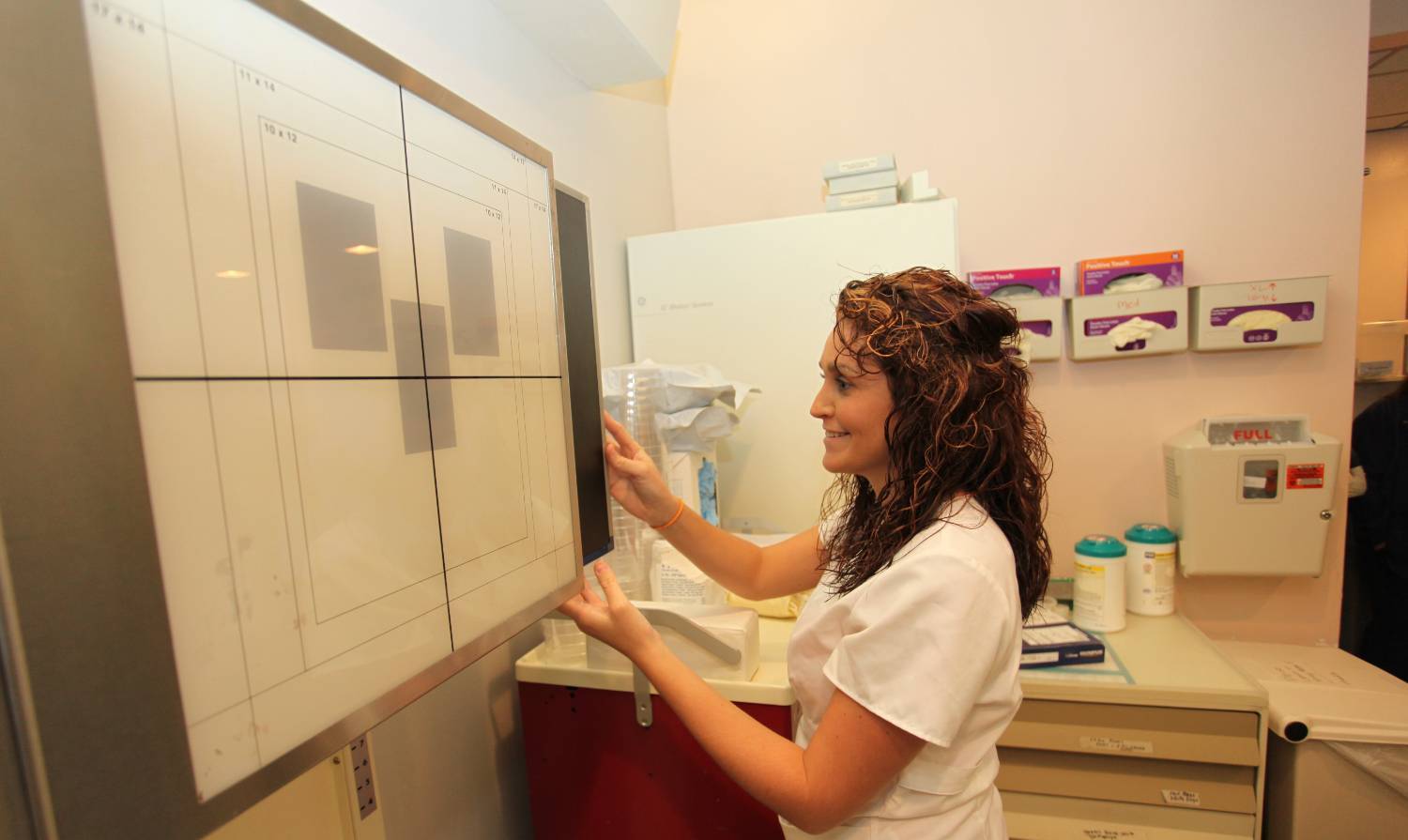
Additional Information about the Radiography Degree
Accreditation
The Radiography Program at Daytona State College is accredited by the Joint Review Committee on Education in Radiologic Technology (JRCERT), 20 N. Wacker Dr., Suite 2850, Chicago, IL 60606-3182. Phone: (312) 704-5300 Fax: (312) 704-5304 and Website: Joint Review Committee, mail@jrcert.org and www.jrcert.org. The program was evaluated according to the Standards for an Accredited Educational Program in Radiography (2014). The JRCERT awarded eight years of accreditation effective from May 2017. The next site visit is tentatively scheduled for the Second Quarter of 2025.
During the educational process, student radiographers are exempt from Florida Licensure Statute-Chapter 468.
Daytona State College is accredited by the Southern Association of Colleges and Schools Commission on Colleges (SACSCOC) to award associate and baccalaureate degrees. Daytona State College also may offer credentials such as certificates and diplomas at approved degree levels. Questions about the accreditation of Daytona State College may be directed in writing to the Southern Association of Colleges and Schools Commission on Colleges at 1866 Southern Lane, Decatur, GA 30033-4097, by calling (404) 679-4500, or by using information available on SACSCOC’s website (www.sacscoc.org).
-
Program Effectiveness Data Halifax Health Medical Center (Program #2251) Transferred Sponsorship to Daytona State College in January 2021 (Program #0686). Consistent with JRCERT Policy 11.400, Procedure 11.404B, the JRCERT does not require that historical program effectiveness data (credentialing examination pass rate, job placement rate, and program completion rate) be transferred to the new sponsor, unless the terminal award remains the same. Because the newly transferred program does not have five years of data for credentialing examination pass rate and job placement rate or one year of data for program completion rate, JRCERT records will identify pass rate, job placement rate, and program completion rate as “0.” A “0” for these program effectiveness measures will be reflected on the Program Effectiveness Data section of the JRCERT Web site. The following program Effectiveness data is from when Halifax Medical Center was the sponsoring institution.
For additional information on program effectiveness data, visit https://www.jrcert.org/programs/daytona-state-college/.


